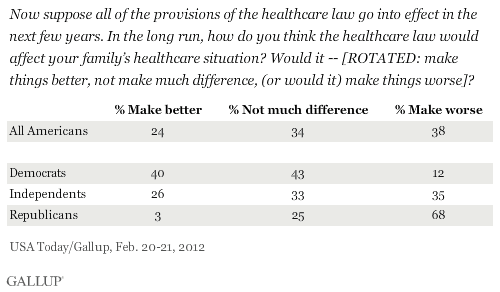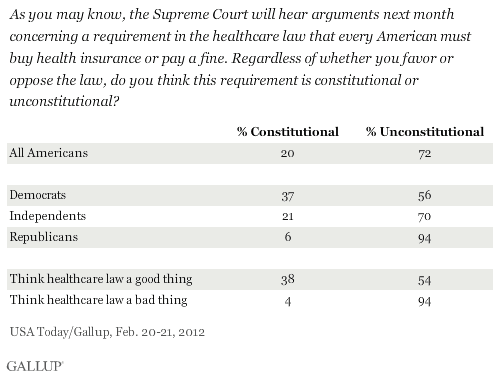February 27, 2012 - Gallup
Americans Divided on Repeal of 2010 Healthcare Law
Majority of Republicans strongly favor repeal if a Republican is
elected president
by Jeffrey M. Jones
PRINCETON, NJ -- Americans divide evenly when asked if they favor (47%) or
oppose (44%) a Republican president's repealing the 2010 healthcare law if
elected this November. Republicans overwhelmingly favor repeal (87%) and
Democrats overwhelmingly oppose it (77%). However, Republicans hold their views
much more intensely than Democrats, with 56% of Republicans strongly favoring
repeal and 39% of Democrats strongly opposing it.

Thus, a Republican president would have a clear mandate from his own party's
supporters to attempt to overturn the law, as all of the Republican candidates
have vowed to do if elected. However, such a position may turn off about as many
independent voters as it attracts.
Americans are also split in their basic views of whether Congress' passing
the law was a good (45%) or a bad thing (44%). This has generally been the case
ever since the law was passed, though opinion tilted slightly more positive
immediately after its passage and slightly more negative last fall, when
Americans' economic confidence was low.

A few provisions of the healthcare law have already gone into effect, though
it will not be fully implemented until later this decade, if it survives an
upcoming challenge in the U.S. Supreme Court. To date, 7 in 10 Americans say the
law has not had an effect on them personally, with about equal proportions
saying it has helped (12%) or hurt (16%) them.
Americans are less optimistic that the law will improve their family's
healthcare situation in the long run, however. Thirty-eight percent expect the
law to make their situation worse, compared with 24% who say better. Thirty-four
percent do not expect it to make much difference.
Not surprisingly given their opposition to the law, Republicans hold a dim
view of the law's prospects for their own healthcare. Sixty-eight percent of
Republicans think the law will make their own healthcare situation worse,
compared with 3% saying better. Democrats are fairly evenly split as to whether
the law will improve their healthcare situation or not make much difference,
while independents do not exhibit much consensus on the law's likely impact.

Americans Do Not Think Individual Mandate Passes Legal
Muster
The Supreme Court next month will hear legal challenges to the healthcare
law, which are focused on the law's requirement that all Americans purchase
health insurance or pay a fine. Americans overwhelmingly believe the "individual
mandate," as it is often called, is unconstitutional, by a margin of 72% to
20%.
Even a majority of Democrats, and a majority of those who think the
healthcare law is a good thing, believe that provision is unconstitutional.

A series of lower-court rulings have so far disagreed as to whether the
provision violates the Constitution.
Implications
The Patient Protection and Affordable Care Act of 2010 law has been arguably
President Obama's most significant legislative achievement to date. Yet
Americans have not shown clear majority support for it, before
or after its passage. Rather, they have generally been divided, likely because
Republicans' overwhelming opposition has counterbalanced Democrats' overwhelming
support for it.
It is not clear that public support for the legislation will increase as long
as Republican leaders and rank-and-file Republicans remain steadfastly
opposed.
The law's fate remains very much in question even before it is fully
implemented, due to legal challenges and some elected officials' desire to work
to repeal or otherwise not implement the law.
To date, few Americans report any effect of the law on their own healthcare
situation, though that would likely change in the coming years if the law is
implemented as planned. If this happens, Americans' opinions could shift,
depending on whether the law benefits or harms them personally, and whether they
perceive it to improve the broader U.S. healthcare system or to make it
worse.